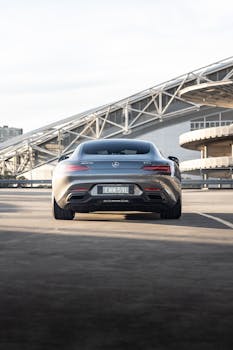
**
Luxury Car Sales Surge Amidst Economic Upswing: Mercedes-Benz India Reports Robust Demand, Fuels Positive Buyer Sentiment
The Indian luxury car market is experiencing a significant upswing, mirroring a broader trend of positive buyer sentiment fueled by a recovering economy and a robust real estate sector. This positive economic climate is reflected in recent sales figures and investments by major players like Mercedes-Benz India, who recently launched two high-performance sports cars, further solidifying the luxury segment's resilience.
Mercedes-Benz India's Strategic Investment and New Launches
Mercedes-Benz India recently unveiled its AMG GT 63 and GT 63 S PRO, priced at a substantial Rs 3 crore and Rs 3.65 crore respectively. This bold move underscores the company's confidence in the burgeoning high-end car market despite lingering global economic uncertainties. Managing Director and CEO, Santosh Iyer, highlighted the sustained demand for luxury vehicles, a clear indication of a strengthening consumer confidence.
This launch is not an isolated event. Mercedes-Benz India has committed a significant investment of Rs 3,000 crore, demonstrating a long-term commitment to the Indian market. A key component of this investment is focused on electric vehicle (EV) production, signaling the company's proactive approach to sustainability and the growing demand for eco-friendly luxury vehicles. The company is currently producing two EV models, further showcasing its dedication to future-proof its presence in the competitive Indian automotive market.
The Interplay of Real Estate and Luxury Car Markets: A Symbiotic Relationship
The positive sentiment in the luxury car market is intricately linked to the flourishing real estate sector. The correlation between these two seemingly disparate markets is becoming increasingly evident. A thriving real estate market often indicates improved economic conditions and increased disposable income, directly impacting consumer spending on luxury goods, including high-end vehicles. This creates a positive feedback loop, with rising property values fueling confidence and driving demand for luxury cars.
This connection is not merely anecdotal; various economic indicators support this observation. Rising property prices in major metropolitan areas like Mumbai, Delhi, and Bangalore, coupled with increased infrastructure development, are contributing to a wealth effect that positively impacts the luxury car market. Individuals experiencing significant appreciation in their property investments are more likely to consider luxury purchases, including high-performance vehicles.
This economic interconnectedness is further evidenced by the rising demand for luxury amenities and experiences. As individuals invest in premium real estate, their lifestyle choices often reflect this elevated status, leading to increased spending on luxury goods and services, such as high-end automobiles.
Factors Driving the Upswing in Luxury Car Sales in India:
Several factors contribute to the observed surge in luxury car sales:
- Economic Growth: India's continued economic growth, although facing global headwinds, has created a larger pool of high-net-worth individuals with disposable income to spend on luxury items.
- Improved Infrastructure: Improved infrastructure in major cities makes owning and driving luxury cars more convenient and enjoyable.
- Brand Prestige: Owning a luxury car remains a status symbol, contributing significantly to the market demand.
- Technological Advancements: New features, innovative designs, and sustainable technologies in luxury vehicles are driving sales.
- Financing Options: The availability of attractive financing options for luxury car purchases makes them more accessible to potential buyers.
- Growing Middle Class: A burgeoning middle class with increased spending power is gradually entering the market for premium vehicles.
Challenges and Future Outlook for the Luxury Car Market:
Despite the positive outlook, challenges remain for the luxury car segment:
- Global Economic Uncertainty: Global economic instability and geopolitical events can still impact consumer sentiment and spending patterns.
- Regulatory Changes: Changes in government regulations, including import duties and emission norms, can affect the pricing and availability of luxury vehicles.
- Competition: Intense competition from both domestic and international brands necessitates continuous innovation and strategic marketing efforts.
- Supply Chain Disruptions: Global supply chain disruptions can impact the timely delivery of vehicles and spare parts.
However, the overall outlook for the Indian luxury car market remains optimistic. The positive economic indicators, coupled with sustained demand and strategic investments by major players like Mercedes-Benz India, point towards continued growth in the coming years. The robust real estate market will likely play a crucial role in further bolstering consumer sentiment and driving sales in this lucrative segment. The growing preference for electric vehicles and the focus on sustainability will further shape the future of the Indian luxury car market. The upcoming festive season is expected to witness further acceleration in sales, solidifying the positive trend observed throughout the year.




















